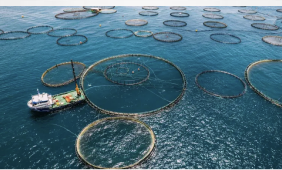President Donald Trump’s first-term push to open the Gulf of Mexico and other federal waters to fish farming has come to a halt in the early days of his second term
A federal judge in Washington state ruled against a nationwide aquaculture permit the Trump administration sought in 2020. The wide-ranging permit would have allowed the first offshore farms in the Gulf and the likely expansion of the aquaculture industry into federally managed waters on the East and West coasts.
The ruling, issued by U.S. District Court Judge Kymberly K. Evanson on March 17, was applauded by several environmental groups.
“A nationwide permit isn’t at all appropriate because our federal waters are so different,” said Marianne Cufone, executive director of the New Orleans-based Recirculating Farms Coalition, a group opposed to offshore aquaculture. “Florida is not Maine. California is not Texas. And in just the Gulf of Mexico, there are significantly different habitats [and] different fish species that could be affected.”
Offshore aquaculture, which involves raising large quantities of fish in floating net pens, has been blamed for increased marine pollution and escapes that can harm wild fish populations. In the Gulf, there’s particular concern about the “dead zone,” a New Jersey-size area of low oxygen fueled by rising temperatures and nutrient-rich pollution from fertilizers, urban runoff, and sewer plants. Adding millions of caged fish would generate even more waste and worsen the dead zone, Cufone said.
Fish farming is an “existential threat” to the Gulf’s fishing industry, said Ryan Bradley, executive director of the Mississippi Commercial Fisheries United. Besides the “cascading negative impacts” on the environment, offshore aquaculture often undercuts the prices of wild-caught fish and shrimp, he said. The Gulf’s fishers are already facing intense competition from foreign fish farms.
“Offshore aquaculture poses too much risk and not enough reward,” Bradley said.
The aquaculture industry says fish farming is the only way to meet surging demand for seafood, particularly high-value species like salmon and tuna. As wild fish stocks struggle under climate change, offshore farming could help the U.S. adapt, producing food in a managed environment less affected by ecological conditions, aquaculture advocates say.
Late last year, the National Oceanic and Atmospheric Administration identified five areas in the Gulf that the agency said are best suited for offshore aquaculture. The development of these “aquaculture opportunity areas” near the coasts of Texas and Louisiana received a strong push during Trump’s first term but slowed under President Joe Biden. Evanson’s decision blocks what might have been a speedy approval process for fish farms in opportunity areas.
A cumbersome permitting process and opposition from environmentalists and catchers of wild seafood had long stymied plans for fish farms in the Gulf, which Trump recently renamed the Gulf of America. In 2020, the aquaculture industry got a big boost when Trump signed an executive order that directed federal agencies to “identify and remove unnecessary regulatory barriers” restricting farming in federal waters.
Read more
https://grist.org/food-and-agriculture/judge-hits-brakes-trump-fast-track-fish-farms-gulf/




